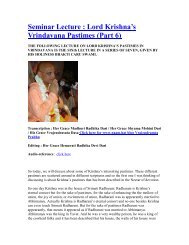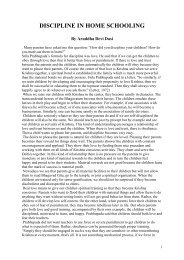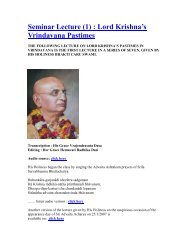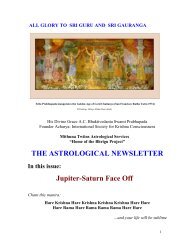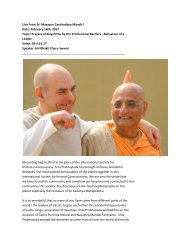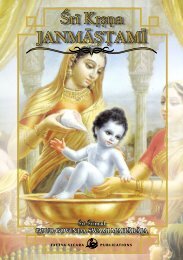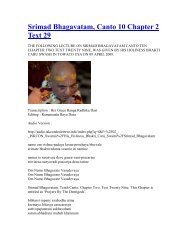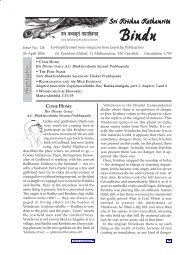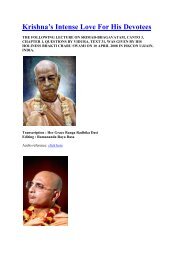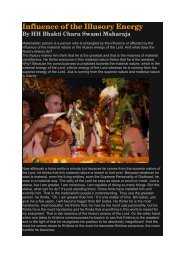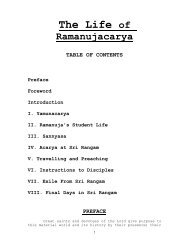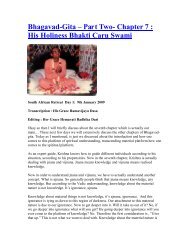Infallible Vedas - Spiriton - ebooks - ISKCON desire tree
Infallible Vedas - Spiriton - ebooks - ISKCON desire tree
Infallible Vedas - Spiriton - ebooks - ISKCON desire tree
Create successful ePaper yourself
Turn your PDF publications into a flip-book with our unique Google optimized e-Paper software.
ISSUE<br />
07<br />
FORTNIGHTLY<br />
NEWSLETTER OF<br />
HARINAAM<br />
SANKIRTAN<br />
SEVA SAMITI<br />
<strong>Spiriton</strong><br />
this issue<br />
<strong>Vedas</strong><br />
P.1<br />
Origin of <strong>Vedas</strong> P.2<br />
World Religions<br />
P.3<br />
Panchatatva Mantra<br />
jaya sri-krishna-chaitanya<br />
prabhu nityananda<br />
sri-adwaita gadadhara<br />
shrivasadi-gaura-bhakta-vrinda<br />
“I offer my respectful<br />
obeisances unto Sri Caitanya<br />
Mahaprabhu, Lord<br />
Nityananda, Sri Advaita,<br />
<strong>Infallible</strong> <strong>Vedas</strong><br />
Hare Krishna Friends,<br />
Please accept our respectful obeisance!<br />
Parallels in the <strong>Vedas</strong> & Science P.6<br />
Vedic Predictions P.7<br />
Vedic Knowledge P.8<br />
Gadadhara Pandit, Srivas<br />
Thakur, and all the devotees<br />
of Lord Caitanya”.<br />
We have understood that only one who hears from authoritative sources can understand the<br />
science of God. If one has been an automobile specialist for twenty years or so and knows the<br />
science of automobiles, he can judge the condition of a vehicle as soon as he drives it even for a<br />
Maha Mantra<br />
Hare Krishna<br />
Hare Krishna<br />
Krishna Krishna<br />
Hare Hare<br />
Hare Rama<br />
Hare Rama<br />
Rama Rama<br />
Hare Hare<br />
Chant Hare<br />
Krishna Mantra<br />
and be happy...<br />
minute. Similarly one who knows the science of God can immediately see the hand of God in every<br />
single aspect of the cosmos from the microscopic to the macroscopic. But one who has no<br />
knowledge of the science of God cannot understand the working of the world.<br />
By hearing the spiritual sound vibration of the scriptures, one's heart becomes cleansed of all sinful<br />
propensities like lust, anger etc. Thus when one learns to see things as per the direction given in<br />
scriptures, then one can see things as they are. This is called "Shastra Chakshu".<br />
The <strong>Vedas</strong> - The privilege of Humanity<br />
Anyone who has a <strong>desire</strong> to know the Absolute Truth and approaches the authority can understand<br />
the Veda, a body of knowledge. Veda means body of knowledge of everything that exists, not only<br />
this earth but the entire cosmic manifestation, its creation and its purpose. <strong>Vedas</strong> are not the<br />
monopoly of a few people who know it and say it is geographical. <strong>Vedas</strong> can't be restricted by<br />
geographical area or a group of people - it's the absolute truth. Now, why do we accept the <strong>Vedas</strong>?<br />
Because the <strong>Vedas</strong> are given by an absolute source.<br />
SPIRITON<br />
Newsletter
So, the Vedic statements are axiomatic truths. What are axiomatic truths? They are truths that are statements by itself. You<br />
can't take shelter of some other statement. This statement is a proof because the statement itself says. You have to read the<br />
axiom, from which everything comes out. It does not exist on somebody else's authority. On its own authority it's the truth. So,<br />
<strong>Vedas</strong> are the truth, because it is infallible. What is the proof? Let's understand this science by analysis.<br />
The logic of atheists is based on perception (Pratyaksha Pramana), which was propagThe source of all sources, the Supreme<br />
Personality of godhead Sri Krishna first revealed the Vedic knowledge to Brahma. Brahma passed the <strong>Vedas</strong> on to Narada Muni,<br />
who passed them to Vyasa.ated by the sage Charvaka. Perception means the knowledge derived from the observation with the<br />
naked eyes.<br />
The Origin of the <strong>Vedas</strong><br />
Srila Vyasadeva, who is the literally incarnation of Lord Vishnu,<br />
compiled the Vedic literatures. If one wants to be protected from<br />
ignorance even in this age of Kali, one may consult the books left by<br />
Srila Vyasadeva: the Upanishads, Vedanta-sutra, Mahabharata,<br />
Srimad Bhagavatam, and the other seventeen puranas.<br />
<strong>Vedas</strong> - The Manual for Mankind<br />
The <strong>Vedas</strong> are directly the word of God revealed at the time of<br />
creation. When you buy a motor cycle, you get an instruction manual<br />
explaining how to use it. Similarly, at the time of creation, God gave<br />
us the Vedic scriptures for direction on how to behave in this world,<br />
which is like a complicated machine. If you fail to study the manual,<br />
before using the motor cycle, you can expect an accident. In the<br />
same way, People who fail to study the <strong>Vedas</strong>, which are the word of<br />
God, but lead life dictated by their own minds, find themselves in a<br />
total mess. Modern man has made a messy world by neglecting the<br />
manual supplied by God.<br />
The source of all sources, the Supreme Personality of godhead Sri<br />
Krishna first revealed the Vedic knowledge to Brahma. Brahma<br />
passed the <strong>Vedas</strong> on to Narada Muni, who passed them to Vyasa.<br />
First Vyasa divided the <strong>Vedas</strong> into four parts, then he explained them in the Puranas, and for less capable people he wrote the<br />
Mahabharata. In the Mahabharata, Bhagavad-gita is given. Then all Vedic literature was summarized in the Vedanta-sutra, and<br />
for future guidance he gave a natural commentary on the Vedanta-sutra, called Srimad-Bhagavatam, which is the ripened fruit<br />
of all Vedic Knowledge.<br />
Vedic Knowledge doesn't come from any materially conditioned person but from the Supreme Lord. According to the Vedic<br />
tradition, the <strong>Vedas</strong> are absolute and self authoritative. The same is confirmed in the Bhagavad Gita (3.15). "The <strong>Vedas</strong> are<br />
directly manifested from the infallible Supreme Personality of Godhead".
Who Recorded the <strong>Vedas</strong>?<br />
People in the previous ages were so intelligent and had such sharp memories that by hearing once from the spiritual master they<br />
would understand and remember everything. They were therefore known as Shrutidhars (Those who are capable of<br />
remembering by hearing just once). Sukadeva Goswamy heard Srimad Bhagavatam (18,000 verses), once from his father<br />
Vyasadeva. He could easily recollect and repeat the same to Parikshit Maharaj at a later time.<br />
But in the present age of Iron, Kaliyuga, which began 5,000 years ago. The scripture states the symptoms of the general people<br />
in the age of Kali ? "manda sumanda mathayo, manda bhagya hi upadrta" meaning "People in this age are lazy for spirituality.<br />
They have short life spans, with poor memories, and are unlucky and are always disturbed". So, keeping this fact in mind about<br />
the people in the age of Kali, Vyasadeva recorded all the <strong>Vedas</strong> in writing about 5000 years ago.<br />
World Religions - Contradiction or Same?<br />
A question may arise, there are many religions in the world<br />
and everyone says we believe in God and God himself has<br />
given them scriptures. If God himself has given scriptures<br />
to all of them, then<br />
Why are there different scriptures?<br />
Why are there differences in the scriptures?<br />
The source of all sources, the Supreme Personality of<br />
godhead Sri Krishna first revealed the Vedic knowledge to<br />
Brahma. Brahma passed the <strong>Vedas</strong> on to Narada Muni,<br />
who passed them to Vyasa.<br />
If one manufacturer is manufacturing only one product,<br />
but for different people he gives different manuals, that's<br />
not right, it's wrong. The product is the same, the<br />
manufacturer is the same but He has given different<br />
manuals to different people. That sounds ridiculous. How<br />
do we understand since every religion claims that God has given them the scriptures, then why different scriptures? It is not that<br />
different religions have different Gods, it is created by one person and the product is the same, everyone is living in one world.<br />
Why is there fighting?<br />
Actually, there is no difference in all bonafide scriptures. There is no difference in truth, in principle. According to time place and<br />
circumstance, the details may vary - but the principles never change. Its practical application according to time, place and<br />
circumstance may be different. So, different scriptures are meant for different audiences and are revealed according to time,<br />
place and circumstance. In principle there is no change or contradiction.
Lets take an example to make this point clear, before<br />
independence, Gandhiji requested all Indians to use<br />
Khadi. At that time, Britishers were ruling India. They<br />
would take the raw materials from India, manufacture it in<br />
their factories with labour and sell them back to us at a<br />
high price. Therefore Gandhi said "No", we will<br />
manufacture our own cloth and will become self-reliant.<br />
For self-reliance and simplicity Gandhiji introduced Khadi.<br />
Anyone who wore khadi, he spoke we want self-reliance<br />
and simplicity. Today we are an independent nation, we<br />
manufacture our own clothes not only khadi but many<br />
varieties, but, still there are two kinds of followers of<br />
Gandhiji. One fellow says Gandhi said Khadi - so wear<br />
khadi. If khadi is not available in India, get imported khadi<br />
but wear khadi because Gandhi said khadi. That is called a<br />
fanatic following. A fanatic follower sticks to the letter of<br />
the law but misunderstands the letter of the law. Now<br />
there may be a sincere follower of Gandhi who understands the principle behind Khadi. If he is a medical representative, he wears<br />
tie, suit, boot etc manufactured in India and maintains himself with only 2 sets for simplicity. But according to his profession,<br />
according to time, according to the situation, he leads a simple life and does his profession.<br />
One, who seeks the spirit of the law, is a real follower. One, who sticks to the letter of the law, becomes a fanatic. The problems are<br />
not because of the scriptures. The scriptures are pure because they are represented by the representatives of the same Lord.<br />
Scriptures are revealed by the Lord from within and the messenger becomes an instrument to deliver the message. So, all<br />
bonafide profounders of the Vedic body of knowledge, at different places, in different times have given the details differently but<br />
the principles remain the same. All the scriptures agree that the lord is Supreme. La illah il allah - There is no one other than the<br />
lord. Even in the Bible, it claims that the Lord is Supreme. There is no one above him. The Bhagavad Gita also says - God is<br />
Asamourdhva. There is no one equal to him or no one above him. The principle is the same. Every religion says, be not attached to<br />
the external sense gratification. Every religion says, the essence is to surrender to God. In fact, the word Islam means surrender.<br />
And when Jesus Christ was asked by his disciple Moses,<br />
he said "Thou shall love thy god will all thy heart and all<br />
thy soul, all thy mind. Love thy neighbour as thyself".<br />
Which means Love and love means surrender. What is<br />
Islam? Islam means surrender and the Bhagavad Gita<br />
also concludes "sarva dharmaan parityajya mam ekam<br />
sharanam vraja" abandon all varieties of religion you<br />
have concocted and completely surrender unto Me. The<br />
principle of all religions is the same. But unfortunately<br />
we do not understand this from a proper source, and are<br />
trying to break our head against the wall and make our<br />
own concoctions, People see only the details. There will<br />
be differences in details. The more you focus on the
For example, let us take different<br />
dictionaries. There is a 17 volume<br />
Websters dictionary and the same<br />
Webster company produces pocket<br />
dictionary, medical dictionary,<br />
technical dictionary and so on.<br />
Now, do you think the meaning<br />
within the pocket dictionary will be<br />
very different from the meanings<br />
in the original Websters.<br />
Obviously not, but, the purpose is different. The pocket dictionary is meant to be carried in a pocket. You can't imagine a huge 17<br />
volume put in a pocket. Pocket dictionary means it is for immediate reference for local usage for 2,000 to 3,000 words and for<br />
immediate meanings whatever is required. But, for a huge 17 volume Websters, you may find all different usages like old usage,<br />
current usage and current different shades of usage. Each word may be explained in two pages and therefore it is a huge detail.<br />
Both manufactured by the same person, same company and it is also a dictionary. But the purpose differs according to what its<br />
use and whom it is used by. So, anyone who understands the essence, and knows the full detail can expertly according to time,<br />
place and circumstance apply the knowledge. Therefore, the problem today is that nobody has accessed the knowledge in a<br />
scientific or systematic way and we have plenty of self-claimed Gurus. It's like the doctor, suddenly saying, I have brought the<br />
books from the library and have read it - so I am a doctor, I know everything. First, he has to obtain a medical degree from a<br />
recognized university. Therefore if this knowledge is not received, through an unbroken chain of disciplic and presented without<br />
interpretation, but after thoroughly digesting according to time, place and circumstance, it is bound to create fanatiscm, it is<br />
bound to create religious wars. Even within one particular religion, there are so many sects, so much of differences of opinions,<br />
strong fights, that's Kaliyuga.<br />
So, the <strong>Vedas</strong> are like the 17 volume of Websters, and all the other products that have come out, according to time, place and<br />
circumstance, Lord has revealed to these people. We find the Bible, a restricted body of knowledge, in creation, there is a chapter<br />
on Genesis, 2 chapters, Lord said let there be light and there was light, within 7 days, light was created that's all. The principle is<br />
that God wanted and created. If you read the Vedic literature it says, chapters after chapters and cantos after cantos, from the<br />
subtlest point to the grossest point in details about creation. How first ether came, from there fire, water, from all these earth,<br />
from subtle to gross how this entire Sristi or creation came about. Unimaginable, in any other scriptures, that is the Veda, because<br />
the Veda means the original source of knowledge which contains everything under the sun. It is not that Jesus Christ was less selfrealized<br />
or Mohammed was less self-realized. But, the people whom they were speaking to were of that type and they spoke<br />
accordingly.<br />
Can We Put Faith in the <strong>Vedas</strong>?<br />
At every step in life we put faith, but only after making sure that the authority is reliable. For example when we buy a railway ticket<br />
from any ordinary person on the platform we are hesitant and doubtful, but if we buy it from the ticket counter we are confident.<br />
Similarly if we want to locate an address we have to approach the proper authority, otherwise we may be misled.
In a similar fashion if we want to know the fundamental truths of life, we need to find an authoritative source of information.<br />
For a source of information to be accepted as authoritative,<br />
It should be infallible (never disproved) and<br />
It should have withstood the test of time (never amended)<br />
This is true only with Vedic knowledge. Does modern science meet this criterion? No, because it is always being revised updated<br />
and modified. Thus nothing in modern science is a certain truth; today?s fundamental principles may become obsolete tomorrow.<br />
The Vedic knowledge since time immemorial is infallible, has never been proved wrong. Every statement of it has stood the test of<br />
time and never been proved to be false. This is the proof of the authority of the body of knowledge. That suddenly we have to<br />
make an amendment, suddenly we realized that whatever statement we made is wrong and that we had told something else,<br />
does not happen with vedic knowledge. No, the Vedic truths are existing since time immemorial and they are true and have been<br />
found to be true for all times to come all people under all circumstances, that is Veda. What is the proof? We will give your briefly<br />
because there are so many.<br />
Parallels in the <strong>Vedas</strong> and Modern Science<br />
We can cite innumerable instances from the <strong>Vedas</strong>, which illustrate concepts similar to concepts from modern science. Modern<br />
scientists are wonder-struck on seeing these striking similarities and they cannot even imagine how such truths were written<br />
down at a time when there were no sophisticated instruments. A few examples showing similarities in the knowledge obtained<br />
from modern science and the <strong>Vedas</strong> are:<br />
The Mahabharata describes how once, when Gandhari was<br />
pregnant, in a fit of anger, she struck her womb and consequently had a<br />
miscarriage. The lump of flesh that came out of her womb was cut into<br />
100 pieces. The great sage Vyasadeva instructed her to place these<br />
pieces in 100 ghee pots. And that is how the Kauravas were born. Dr.<br />
B.G. Matapurkar, a surgeon with Maulana Azad Medical College, New<br />
Delhi states, "They not only knew about test tube babies and embryo<br />
splitting but also had the technology to grow human fetuses outside the<br />
body of a woman - something that is not known to modern science." -<br />
THE TIMES OF INDIA, 5 May 2002.<br />
In the Srimad Bhagavatam, which was compiled 5000 years ago, by Vyasa it says, "This planet earth is considered to be<br />
bhoogol and it has sapta dweep, seven continents, seven islands". Now, only in the last 15th century America was discovered and<br />
until then when Columbus started sailing, people thought that the world is flat and he will go and fall into nowhere. People were<br />
not clear; at last by modern science we realized that the earth has to be round. People wouldn't understand, that fellow from down<br />
will fall down. We are not able to understand, but scriptures, these were compiled 5,000 years ago and had the knowledge and<br />
was known much before, says its bhoogol. Bhoo means the planet earth and gol means round and not only that it has seven<br />
islands.
In the Ramayana, it is described how Ravana would fly from one place to another in a Vimana (The Wright brothers were<br />
thus not the original inventors of the airplane!).<br />
Using a variety of complicated instruments, gynaecologists have gradually come to know how the embryo grows during<br />
the period of pregnancy. But the Srimad Bhagavatam, 3rd Canto, 31st Chapter, gives a vivid description of the information given<br />
in a standard medical textbook, such as the embryology section of Gray's Anatomy, there are incredible similarities in the<br />
information obtained from the two sources.<br />
The <strong>Vedas</strong> state that cow dung, in spite of being the stool of an animal, is pure. It was only in 1940 that the antiseptic<br />
qualities of cow dung were discovered.<br />
The <strong>Vedas</strong> have stated since time immemorial that plants have life. But until Jagadish Chandra Bose proved that plants<br />
have feelings, scientists believed that they were inanimate.<br />
In the Mahabharata, Asvatthama sent a brahmastra at Uttara, which targeted the foetus in her womb without causing any<br />
injury whatsoever to her. (The brahmastra is far more powerful and accurate than the nuclear missiles of today).<br />
The Kurukshetra war involved many subtle celestial weapons like shabdabhedi, vayavya, parthavya, bhaumya,<br />
anthardana etc., which are far more sophisticated than the gross weapons known to scientists today!<br />
Vedic Predictions That Have Come True<br />
The <strong>Vedas</strong> also make accurate predictions about the appearance of incarnations or great personalities. Some of the personalities<br />
predicted (along with the text in which they are predicted) are given below:<br />
Buddha (Shrimad Bhagavatam 1.3.24)<br />
Chanakya (Shrimad Bhagavatam 12.1.11)<br />
Chaitanya Mahaprabhu (Mahabharata 127.92.75,<br />
Shrimad Bhagavatam 11.5.32)<br />
Chandragupta and Emperor Ashoka (Shrimad Bhagavatam 12.1.12)<br />
Jesus and Mohammed (Bhavishya Purana, Atharva Veda, Kanda 20, Shukta 127, 1-3)<br />
There are also vivid predictions about the degradations that will occur in Kali Yuga (the current age). Some of them<br />
are:<br />
1. Food will be sold publicly in market places. (In the past, food was never sold; it was only<br />
given in charity. But nowadays every third shop sells food items - the rate which we see<br />
Darshini chains one can understand this).<br />
2. People will eat the flesh of their own foetus. (In the past, the child would be revered and<br />
loved as a gift of God. But nowadays in China, Japan and several other countries, people<br />
consider the aborted fetus a special delicacy and eat it with a bestial relish).
3. Man-Woman relationship will be based on sex and not on any other<br />
higher goal. (Previously marriage was considered a sacred duty meant not<br />
for enjoyment but for increasing one's service to God. But one can note the<br />
growing frequency of marriage without any actual ceremony or agreement<br />
and of "living together". Both of these are becoming increasingly and<br />
alarmingly common).<br />
4. "lavanyam kasha dharranam" - Men with long hair will be considered<br />
beautiful.<br />
5. "vipratve sutrameva hi" - A brahmana will be known just by his wearing<br />
a thread. (A real brahmana is one who actually possess the qualities of a<br />
brahmana such as self-control, austerity etc)<br />
If the <strong>Vedas</strong> are of mundane origin then how is it possible for them to state<br />
profound truths which modern science has only recently started<br />
discovering? And how can they make accurate predictions about future<br />
happenings? The conclusion is unmistakably obvious: the <strong>Vedas</strong> are<br />
coming from a person who is all knowing, who knows the past, the present<br />
and the future. In other words, the <strong>Vedas</strong> are the words of God, so it is<br />
infallible.<br />
Veda means knowledge. The original knowledge is the teachings of the <strong>Vedas</strong>. In the conditioned state our knowledge is subjected to<br />
many deficiencies. There are four defects that a conditioned soul has: committing mistakes, subject to illusion, cheating propensity<br />
and imperfect senses. These deficiencies make us unfit for having perfect knowledge. Therefore we accept the <strong>Vedas</strong> as they are.<br />
<strong>Vedas</strong> are apaurusheya, which means they are not compilations of human knowledge. Vedic knowledge comes from the spiritual<br />
world, from Lord Krishna, the Supreme Personality of Godhead. In the beginning the first living creature was Brahma. He received<br />
the Vedic knowledge from Krishna.<br />
Srila Prabhupada Speaks out<br />
Vedic Knowledge<br />
Vedic knowledge is called sabda-pramana.<br />
Another name is sruti. Sruti means that this<br />
knowledge has to be received simply by aural<br />
reception. The <strong>Vedas</strong> instruct that in order to<br />
understand transcendental knowledge, we<br />
have to hear from the authority.<br />
Transcendental knowledge is knowledge<br />
from beyond this universe. Within this<br />
universe is material knowledge, and beyond<br />
this universe is transcendental knowledge.<br />
We cannot even go to the end of the universe,<br />
so how can we go to the spiritual world? Thus to<br />
acquire full knowledge is impossible. There is a<br />
spiritual sky. There is another nature that is<br />
beyond manifestation and non-manifestation.<br />
But how will you know that there is a sky where<br />
the planets and inhabitants are eternal? All this<br />
knowledge is there, but how will you make<br />
experiments? It is not possible. Therefore you<br />
have to take the assistance of the <strong>Vedas</strong>. This is<br />
called Vedic knowledge.



